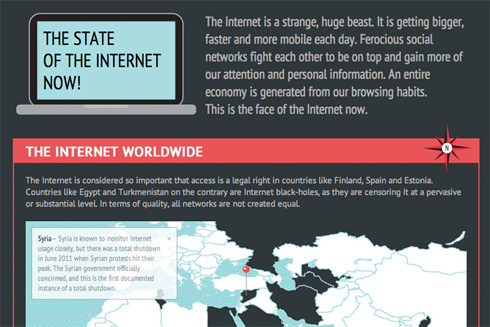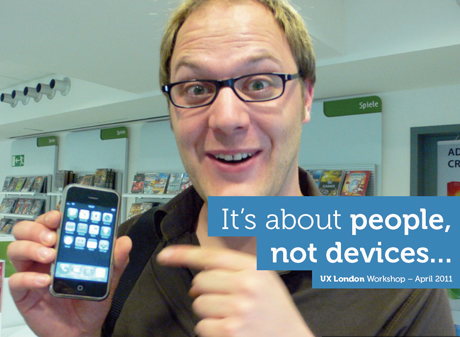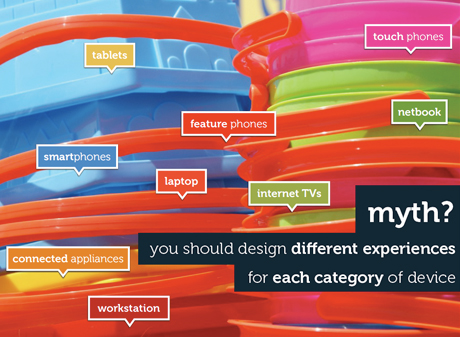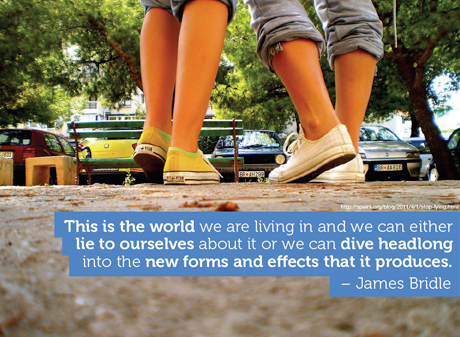Joe Gebbia, the co-founder of Airbnb, bet his whole company on the belief that people can trust each other enough to stay in one another’s homes.
Tag: people
Why emotion is an important part of design
Why do we choose to buy certain things over others? Don Norman explains how designers create the perfect products knowing your emotions.
46 Seconds on Life from Steve Jobs
The world as Steve Jobs saw it:
When you grow up you tend to get told the world is the way it is and you’re life is just to live your life inside the world. Try not to bash into the walls too much. Try to have a nice family, have fun, save a little money.
That’s a very limited life. Life can be much broader once you discover one simple fact: Everything around you that you call life was made up by people that were no smarter than you and you can change it, you can influence it, you can build your own things that other people can use.
Once you learn that, you’ll never be the same again.
A Microsoft Vision Of The Future Of Mobility
The future holds “an expanded definition of productivity where it’s not just about getting things done. It’s also about doing the right things, and doing them well and enjoying the process with other people in a very natural way.â€
In the video, Microsoft paints a world in which smartphones are about the size of a business card, and just about any surface you come into contact with has a touch-sensitive interface.
Perspective: Thinking Outside the App

“So you built an app. People can take your brand anywhere they go. But do they? And where do you go from here? Have apps delivered the value you expected from mobile? “
An article worth reading by punchcut if you don’t just want to join a App Race. It’s important to understand holistic mobile strategy beyond a one-off killer app.
State of the Internet 2011

The Internet has changed the way we live—that’s obvious. But what we think people forget is how big and important the worldwide web really is. Do you know how much time people spend on the Internet every day? The Internet is a strange, huge beast. It is getting bigger, faster and more mobile each day.
This is the face of the Internet now.!
Simon Sinek: If You Don’t Understand People, You Don’t Understand Business
Simon Sinek’s recent talk discusses the importance of trust, authenticity, and meaning. Sinek argues that as individuals and companies, everything that we say and do is a symbol of who we are. And it is only when we communicate our beliefs authentically that we can attract others to our cause, and form the bonds that will empower us to achieve truly great things.
“We’re not good at everything, we’re not good by ourselves,” says Simon Sinek. Our ability to build trust and relationships is the key to our survival as a race, and to thriving as ideamakers.
Infographic: Is Anything Private on Your Phone Anymore?
It’s about people, not devices

We live in exciting times. Times of innovation, invention, and rapid change. Technologies that were unthinkable years ago are now commonplace. Close to 1.5 billion people worldwide use a computer, but that figure pales in comparison to the 4.2 billion (75% of the planet) who use or have access to a mobile phone.
Presentation by yiibu, download here Via UXbooth
In Japan, Cellphones Have Become Too Complex to Use

An interesting short report via Wired that people in Japan feel that phone become too complex with the features they have it. Japan may be in a culture of spec sheets. Where consumers go to electronics stores to buy a cellphone, they frequently line up the specifications side by side to compare them before deciding which one to buy. Some of the famous Japanese mobile companies are NTT DoCoMo, KDDI, SoftBank and they make 5 % of global mobile phone sales, and rest all of those sales are just domestic.
- Japanese handsets have become prime examples of feature creep gone mad. In many cases, phones in Japan are far too complex for users to master.
- “There are tons of buttons, and different combinations or lengths of time yield different results,'” says Koh Aoki, an engineer who lives in Tokyo.
- Experimenting with different key combinations in search of new features is “good for killing time during a long commute,” Aoki says, “but it’s definitely not elegant.”
- Japan has long been famous for its advanced cellphones with sci-fi features like location tracking, mobile credit card payment and live TV. These handsets have been the envy of consumers in the United States, where cell technology has trailed an estimated five years or more. But while many phones would do Captain Kirk proud, most of the features are hard to use or not used at all.
- “Some people care about quality, but first and foremost it’s about the features,” says Nobi Hayashi, a journalist and author of Steve Jobs: The Greatest Creative Director. He estimates that the average person only uses 5 to 10 percent of the functions available on their handsets.
The most important thing for any mobile company whether it is a product or services, is to provide unique user experience to end users.”Cellphones are now a days becomes an integral part of life “People are always using them and holding them, even in the middle of a meal anytime anywhere”.
vivek
Jan Chipchase: an intresting video of his own nomadic life
A very interesting video via The New York Times of Jan Chipchase own life. He spent a week recording his own nomadic life for us in Tokyo and Seattle, taking pictures and leaving phone messages. It shows how wireless communication is changing the way people work, live, love and relate to places and each other.
Very interesting !
vivek




